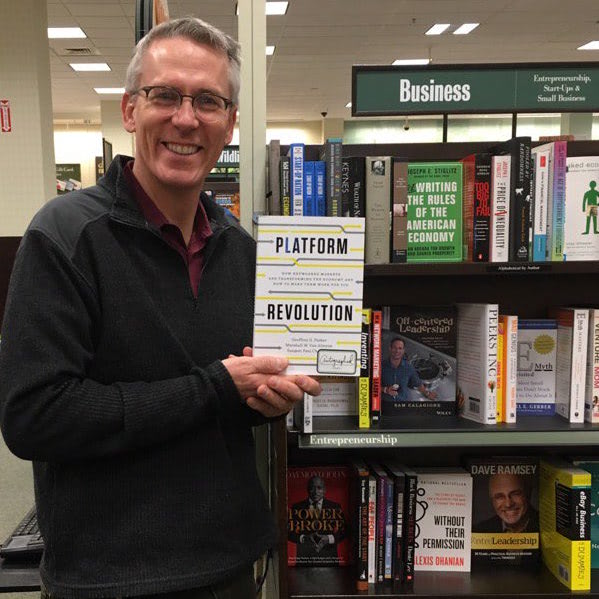- Undergraduate
Bachelor's Degrees
Bachelor of ArtsBachelor of EngineeringPartner School Dual-DegreeUndergraduate AdmissionsUndergraduate Experience
- Graduate
Doctoral Degrees
Doctor of PhilosophyPhD Innovation ProgramDoctor of Medicine-PhDGraduate AdmissionsGraduate Experience
- Research
- Entrepreneurship
- Community
- About
-
All Thayer News
Dartmouth Engineering Professor Co-Authors New Book on Networked Markets
Mar 28, 2016
Out on shelves today is PLATFORM REVOLUTION: How Networked Markets Are Transforming the Economy and How to Make Them Work for You, by Dartmouth engineering professor Geoffrey G. Parker, Marshall Van Alstyne and Sangeet Paul Choudary.
"An authoritative guide to the role of online platforms: what they are, how they work, and what they mean for business and economics. Platform Revolution demystifies the concept by providing clear prose, insightful examples, and practical lessons." —Hal Varian, chief economist, Google, and author of Information Rules
Facebook, Airbnb, Alibaba, Uber — these seemingly disparate, yet extremely successful companies, have upended entire industries by harnessing a single phenomenon: the digital platform business model. Platform businesses use technology to connect people, organizations, and resources in an interactive ecosystem where amazing amounts of value can be created and exchanged. They connect sellers and buyers, hosts and visitors, drivers with people who need rides. They allow someone’s business to connect to yours, build products and services within yours, and co-create value.
PLATFORM REVOLUTION delivers the first comprehensive analysis of how platforms function and their growing impact on practically every sector of the economy. It explains the what, how, and why of this revolution and provides an "owner’s manual" for creating a successful platform business.
The authors show us precisely how platforms work, the varying structures they assume, the numerous forms of value they create, and the almost limitless range of users they serve. They also highlight how platforms are disrupting — and creating opportunity — across almost every industry. Teacher or lawyer, photographer or scientist, plumber or therapist — no matter the profession or industry, the chances are good that a platform is poised to transform it.
In PLATFORM REVOLUTION, the authors aim to answer some of the intriguing questions posed by the rapid rise of the platform model, including:
- How platform businesses such as Uber and Airbnb managed to disrupt and dominate vast traditional industries in just a few years,
- How the rise of the platform transformed the principles governing economic growth and business competition,
- Why in the world of platforms, competition is less important than cooperation and co-creation. Control of relationships becomes more important than control of resources,
- Why some companies solve the challenge of attracting producers and consumers simultaneously to a new platform while others fail miserably,
- How platform users can be protected from abuse, fraud, and other potential dangers
As the authors share their deep knowledge of the platform model, readers are treated to insight into dozens of platforms that are well known globally, like Apple, Google, and Microsoft, three of the world’s five largest firms as measure by market capitalization. And they learn about relative newcomers, such as, Nest (acquired by Google in 2014), a platform for the home in which smart appliances like refrigerators, TVs, and lightbulbs can interact with intelligent thermostats, smoke alarms, and security cameras. Upwork, a global freelancing platform where businesses and independent professionals connect and collaborate remotely, Cohealo, a technology company that helps medical systems share equipment across facilities, and Munchery, one of several food delivery services that are growing exponentially.
PLATFORM REVOLUTION is a clear, complete, and authoritative guide to what is one of the most important economic and social developments of our time. Chapters cover key elements of the platform foundation, providing a roadmap for understanding their structure and for building a successful platform business. Among them:
- Architecture: Principles for Designing a Platform
- Launch: Eight Ways to Launch a Successful Platform
- Monetization: Capturing the Value Created by Network Effects
- Strategy: How Platforms Change Competition
- Policy: How Platforms Should (and Should Not) be Regulated
Parker, Van Alstyne and Choudary examine the industries that are seeing the greatest transformations: education, healthcare, energy, logistics and transportation, and they take a fascinating look at the most plausible, intriguing future scenarios for the expansion and evolution of platforms in those specifics sections of the economy.
Ultimately, readers learn how platforms will transform the world — and how society as a whole must develop creative, humane responses to the challenges these changes will create.
For contacts and other media information visit our Media Resources page.

